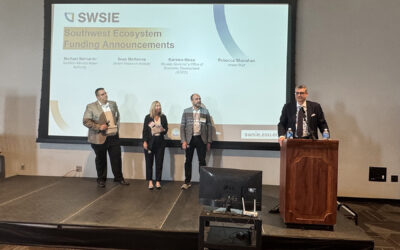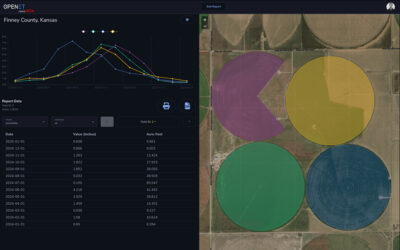All study participants will receive free water quality results and select participants will have a water treatment system installed to reduce their exposure to emerging contaminants.
Reno, Nev. (October 30, 2024) – DRI scientists are recruiting fifteen Fallon residents with private wells to participate in a water quality study. All fifteen study participants will receive free water quality results, and a subset of the well owners will receive water filtration systems.
The research will be used to identify the spatial extent and potential sources of contaminants such as pesticides, microplastics, and flame retardants and quantify the efficacy of treatment systems to reduce concentrations in drinking water. These contaminants, which have been linked to agricultural and military land uses in other studies, have potential to enter the shallow groundwater aquifers that provide water to private wells. This will be among the first studies to investigate the prevalence of these contaminants in the Fallon area, and it builds on previous DRI research that identified high levels of arsenic in Fallon groundwater.
“We know from our previous research and other studies that much of the groundwater in Fallon is unsuitable for drinking if left untreated, due to high levels of arsenic,” says Daniel Saftner, DRI hydrogeologist and one of the lead researchers on the study. “This study will help us gain a better understanding of the extent and possible sources of contaminants of emerging concern, as well as allow us to evaluate water filtration options for community members.”
Each participating community member will receive a full report of how their well water quality compares to EPA drinking water standards, as well as water treatment options and monitoring recommendations. The anonymized data will also be made available to the public.
In addition to Saftner, the project team includes Monica Arienzo, Associate Professor of Hydrology and lead of DRI’s Microplastics Laboratory, as well as Yeongkwon Son, Associate Professor of Environmental Health and an expert in emerging contaminants. Saftner and Arienzo have spent more than three years studying rural well water quality in Nevada and have worked with over 300 well owners.
The research will also contribute to improving water filtration devices that target microplastics, an emerging health concern.
– @driscience –
More information: This research is supported by funding from the Water Quality Research Foundation.
For more information on DRI’s Microplastics and Environmental Chemistry Laboratory, visit https://www.dri.edu/labs/microplastics/
About DRI
We are Nevada’s non-profit research institute, founded in 1959 to empower experts to focus on science that matters. We work with communities across the state — and the world — to address their most pressing scientific questions. We’re proud that our scientists continuously produce solutions that better human and environmental health.
Scientists at DRI are encouraged to follow their research interests across the traditional boundaries of scientific fields, collaborating across DRI and with scientists worldwide. All faculty support their own research through grants, bringing in nearly $5 to the Nevada economy for every $1 of state funds received. With more than 600 scientists, engineers, students, and staff across our Reno and Las Vegas campuses, we conducted more than $52 million in sponsored research focused on improving peoples’ lives in 2024 alone.
At DRI, science isn’t merely academic — it’s the key to future-proofing our communities and building a better world. For more information, please visit www.dri.edu.
Media Contact
Elyse DeFranco
Senior Science Writer & Principal Information Officer, DRI
Elyse.defranco@dri.edu


